World peace
Appearance
World peace is an ideal of freedom, peace, and happiness among and within all nations and/or people. It generally includes an idea of planetary non-violence by which nations willingly cooperate, either voluntarily or by virtue of a system of governance that prevents warfare. The term is sometimes used to refer to a cessation of all hostility among all individuals.
Quotes
[edit]
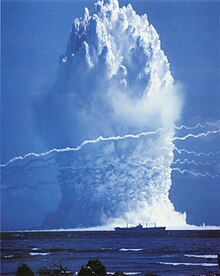

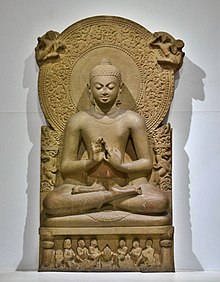
Is one word that brings peace.
Better than a thousand hollow verses
Is one verse that brings peace. ~ Gautama Buddha
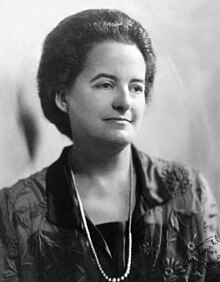



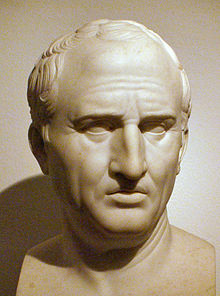

- Behind the black portent of the new atomic age lies a hope which, seized upon with faith, can work out salvation … Let us not deceive ourselves: we must elect world peace or world destruction.
- Bernard Baruch, Address to the United Nations Atomic Energy Commission (14 June 1946).
- Peace is never long preserved by weight of metal or by an armament race. Peace can be made tranquil and secure only by understanding and agreement fortified by sanctions. We must embrace international cooperation or international disintegration. Science has taught us how to put the atom to work. But to make it work for good instead of for evil lies in the domain dealing with the principles of human dignity. We are now facing a problem more of ethics than of physics.
- Bernard Baruch, Address to the United Nations Atomic Energy Commission (14 June 1946).
- これはぼくらの叫びです これは私たちの祈りです 世界に平和をきずくための
- This is our cry. This is our prayer. Peace in the world.
- Let these be guidestones to an Age of Reason
- 1. Maintain humanity under 500,000,000 in perpetual balance with nature.
- 2. Guide reproduction wisely — improving fitness and diversity.
- 3. Unite humanity with a living new language.
- 4. Rule passion — faith — tradition — and all things with tempered reason.
- 5. Protect people and nations with fair laws and just courts.
- 6 Let all nations rule internally resolving external disputes in a world court.
- 7. Avoid petty laws and useless officials.
- 8. Balance personal rights with social duties.
- 9. Prize truth — beauty — love — seeking harmony with the infinite.
- 10. Be not a cancer on the earth — Leave room for nature — Leave room for nature.
- R.C. Christian Georgia Guidestones
- My books, they all have only one message: the heart's Power Of Love must replace the mind's Love Of Power. If I have the Power Of Love, then I shall claim the whole World as my own … World Peace can be achieved when the Power Of Love replaces the Love Of Power.
- Sri Chinmoy, My Heart Shall Give A Oneness-Feast (1993) In The Forbes Book of Business Quotations (1997) edited by Edward C. Goodman and Ted Goodman, p. 639, a similar statement is attributed to William Ewart Gladstone: We look forward to the time when the Power of Love will replace the Love of Power. Then will our world know the blessings of peace. A similar statement has also become attributed to Jimi Hendrix, as well as to Chinmoy: When the power of love overcomes love of power the world will know peace. This is flatly denied to have ever been said by Hendrix, without presenting any evidence as to why, beyond such unsupported, derisive and denigrative statements such as the author rants about others making in "WHAT HENDRIX NEVER SAID : They Don't Want to Know What He Really Said and Demand a Slacker Fantasy Instead" (22 March 2010) by Michael Fairchild, at rockprophecy.com.
- Dick Grayson: What's so important about Chopin?
- Bruce Wayne: All music is important, Dick. It's the universal language. One of our best hopes for the eventual realization of the brotherhood of man.
- Dick Grayson: Gosh Bruce, yes, you're right. I'll practice harder from now on.
- Robert Dozier, "The Joker is Wild", Batman, (January 26, 1966)
- War is obsolete. It could never have been done before. Only ten years ago... technology reached the point where it could be done. Since then the invisible technological-capability revolution has made it ever easier so to do. It is a matter of converting the high technology from weaponry to livingry. The essence of livingry is human-life advantaging and environment controlling. With the highest aeronautical and engineering facilities of the world redirected from weaponry to livingry production, all humanity would have the option of becoming enduringly successful. All previous revolutions have been political—in them the have-not majority has attempted revengefully to pull down the economically advantaged minority. If realized, this historically greatest design revolution will joyously elevate all humanity to unprecedented heights.
- Buckminster Fuller in Critical Path (1981)
- I am the last man in the world to say that the succor which is given us from America is not in itself something to rejoice at greatly. But I also say that I can see more in the knowledge that America is going to win a right to be at the conference table when the terms of peace are discussed…. It would have been a tragedy for mankind if America had not been there, and there with all her influence and power.
- David Lloyd George, speech, at the Meeting of American Residents in London (April 12, 1917); reported in Hoyt's New Cyclopedia Of Practical Quotations (1922), p. 917.
- Peace is a matter of education, and impossible of achievement until we have learned to deal charitably, justly, and openly with one another, as nations as well as individuals. As long as we manufacture arms, peace will not become established. It should become our aim and object to do all we can toward the abolition of militarism in all countries and the establishment of the principle of arbitration of difficulties.
- Max Heindel,Letters to Students: Letter No. 92, July, 1918. TRF, CA, USA (various editions/publishers)
- […]Kant believed that world peace was possible only if the enlightened elites in each country worked hard to promote conscience. Without conscience there would be no peace, no matter how much efforts a society of nations would make. I am not sure that Kant’s notion of conscience was the same as Dr. Hong’s and Tai Ji Men’s. Kant’s one was deeply rooted in a Protestant sense of guilt and sin, and he saw it more as an inner tribunal delivering an internal verdict of guilt for the bad actions we have performed. Yet, his idea of a necessary connection between peace and conscience remains valid.
- Massimo Introvigne, “Perpetual Peace” and the Tai Ji Men Case, Bitter Winter (October 2022)
- Peace with all nations, and the right which that gives us with respect to all nations, are our object.
- Thomas Jefferson, letter to Mr. Dumas (March 24, 1793); H. A. Washington, ed., The Writings of Thomas Jefferson, vol. 3, p. 535
- That peace, safety, and concord may be the portion of our native land, and be long enjoyed by our fellow-citizens, is the most ardent wish of my heart, and if I can be instrumental in procuring or preserving them, I shall think I have not lived in vain.
- Thomas Jefferson, letter to Benjamin Waring and others (March 23, 1801); in Andrew A. Lipscomb, ed., The Writings of Thomas Jefferson, vol. 11 (1903), p. 235
- They dress the wound of my people
as though it were not serious.
‘Peace, peace,’ they say,
when there is no peace.
- We are ready to expand the friendly people-to-people exchanges and enhance exchanges and cooperation in science, technology, culture, education, and other areas... Enhanced interactions and cooperation between China and the United States serve the interests of our two peoples and are conducive to world peace and development.
- Hu Jintao, White House speech (20 April 2006)
- We are ready to expand the friendly people-to-people exchanges and enhance exchanges and cooperation in science, technology, culture, education, and other areas... Enhanced interactions and cooperation between China and the United States serve the interests of our two peoples and are conducive to world peace and development. We should stay firmly rooted in the present while looking ahead to the future, and view and approach China-U.S. relations from a strategic and long-term perspective... We should... respect each other as equals and promote closer exchanges and cooperation. This will enable us to make steady progress in advancing constructive and cooperative China-U.S. relations, and bring more benefits to our two peoples and people of the world...
- Hu Jintao, White House speech (20 April 2006)
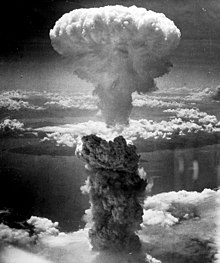



- In a world of danger and trial, peace is our deepest aspiration, and when peace comes we will gladly convert not our swords into plowshares, but our bombs into peaceful reactors, and our planes into space vessels. "Pursue peace," the Bible tells us, and we shall pursue it with every effort and every energy that we possess. But it is an unfortunate fact that we can secure peace only by preparing for war.
- In short, I believe in an America that is on the march — an America respected by all nations, friends and foes alike — an America that is moving, doing, working, trying — a strong America in a world of peace. That peace must be based on world law and world order, on the mutual respect of all nations for the rights and powers of others and on a world economy in which no nation lacks the ability to provide a decent standard of living for all of its people. But we cannot have such a world, and we cannot have such a peace, unless the United States has the vitality and the inspiration and the strength. If we continue to stand still, if we continue to lie at anchor, if we continue to sit on dead center, if we content ourselves with the easy life and the rosy assurances, then the gates will soon be open to a lean and hungry enemy.
- Let the word go forth from this time and place, to friend and foe alike, that the torch has been passed to a new generation of Americans — born in this century, tempered by war, disciplined by a hard and bitter peace, proud of our ancient heritage — and unwilling to witness or permit the slow undoing of those human rights to which this Nation has always been committed, and to which we are committed today at home and around the world.
- Let every nation know, whether it wishes us well or ill, that we shall pay any price, bear any burden, meet any hardship, support any friend, oppose any foe to assure the survival and the success of liberty.
- Finally, to those nations who would make themselves our adversary, we offer not a pledge but a request: that both sides begin anew the quest for peace, before the dark powers of destruction unleashed by science engulf all humanity in planned or accidental self-destruction. We dare not tempt them with weakness. For only when our arms are sufficient beyond doubt can we be certain beyond doubt that they will never be employed....If a beachhead of cooperation may push back the jungle of suspicion, let both sides join in creating a new endeavor, not a new balance of power, but a new world of law, where the strong are just and the weak secure and the peace preserved.
All this will not be finished in the first one hundred days. Nor will it be finished in the first one thousand days, nor in the life of this Administration, nor even perhaps in our lifetime on this planet. But let us begin.
- Now the trumpet summons us again — not as a call to bear arms, though arms we need; not as a call to battle, though embattled we are — but a call to bear the burden of a long twilight struggle... a struggle against the common enemies of man: tyranny, poverty, disease, and war itself.
- Where nature makes natural allies of us all, we can demonstrate that beneficial relations are possible even with those with whom we most deeply disagree-and this must someday be the basis of world peace and world law...The deadly arms race, and the huge resources it absorbs, have too long overshadowed all else we must do. We must prevent that arms race from spreading to new nations, to new nuclear powers and to the reaches of outer space.
- John F. Kennedy First State of the Union Address (30 January 1961)
- We do not intend to abandon our duty to mankind to seek a peaceful solution. As signers of the UN Charter, we shall always be prepared to discuss international problems with any and all nations that are willing to talk — and listen — with reason. If they have proposals — not demands — we shall hear them. If they seek genuine understanding — not concessions of our rights — we shall meet with them. We have previously indicated our readiness to remove any actual irritants in West Berlin, but the freedom of that city is not negotiable. We cannot negotiate with those who say "What's mine is mine and what's yours is negotiable." But we are willing to consider any arrangement or treaty in Germany consistent with the maintenance of peace and freedom, and with the legitimate security interests of all nations. [...] In short, while we are ready to defend our interests, we shall also be ready to search for peace--in quiet exploratory talks--in formal or informal meetings....
- John F. Kennedy Speech during Berlin Crisis of 1961
- Now, in the thermonuclear age, any misjudgment on either side about the intentions of the other could rain more devastation in several hours than has been wrought in all the wars of human history. Therefore I, as President and Commander-in-Chief, and all of us as Americans, are moving through serious days. I shall bear this responsibility under our Constitution for the next three and one-half years, but I am sure that we all, regardless of our occupations, will do our very best for our country, and for our cause. For all of us want to see our children grow up in a country at peace, and in a world where freedom endures. I know that sometimes we get impatient, we wish for some immediate action that would end our perils. But I must tell you that there is no quick and easy solution. [...] We must look to long days ahead, which if we are courageous and persevering can bring us what we all desire....The steps I have indicated tonight are aimed at avoiding that war. To sum it all up: we seek peace — but we shall not surrender. That is the central meaning of this crisis, and the meaning of your government's policy. With your help, and the help of other free men, this crisis can be surmounted. Freedom can prevail and peace can endure.
- John F. Kennedy Speech during Berlin Crisis of 1961
- World peace, like community peace, does not require that each man love his neighbor — it requires only that they live together in mutual tolerance, submitting their disputes to a just and peaceful settlement. And history teaches us that enmities between nations, as between individuals, do not last forever. However fixed our likes and dislikes may seem, the tide of time and events will often bring surprising changes in the relations between nations and neighbors.
- John F. Kennedy in his A Strategy of Peace speech, the Commencement Address at American University (10 June 1963).
- World order will be secured only when the whole world has laid down these weapons which seem to offer us present security but threaten the future survival of the human race. That armistice day seems very far away. The vast resources of this planet are being devoted more and more to the means of destroying, instead of enriching, human life.
But the world was not meant to be a prison in which man awaits his execution. Nor has mankind survived the tests and trials of thousands of years to surrender everything — including its existence — now. This Nation has the will and the faith to make a supreme effort to break the log jam on disarmament and nuclear tests — and we will persist until we prevail, until the rule of law has replaced the ever dangerous use of force.- John F. Kennedy, Second State of the Union Address (11 January 1962)
- These various elements in our foreign policy lead, as I have said, to a single goal — the goal of a peaceful world of free and independent states. This is our guide for the present and our vision for the future — a free community of nations, independent but interdependent, uniting north and south, east and west, in one great family of man, outgrowing and transcending the hates and fears that rend our age.
- John F. Kennedy, Second State of the Union Address (11 January 1962)
- What is desired in order to promote the work of the great Plan is that all these races should be drawn into much closer sympathy. This has already been achieved to a great extent in the case of England and America...The great purpose of this drawing together is to prepare the way for the coming of the new Messiah, or, as we should say in Theosophical circles, the next advent of the Lord Maitreya, as a great spiritual teacher, bringing a new religion. The time is rapidly approaching when this shall be launched—a teaching which shall unify the other religions, and compared with them shall stand upon a broader basis and keep its purity longer. But before this can come about we must have got rid of the incubus of war, which at present is always hanging over our heads like a great spectre, paralyzing the best intellects of all countries as regards social experiments, making it impossible for our statesmen to try new plans and methods on a large scale. Therefore one essential towards carrying out the scheme is a period of universal peace. p. 151
- C.W. Leadbeater, in The Inner Life (1917)
- Oceania was at war with Eurasia: therefore Oceania had always been at war with Eurasia. The enemy of the moment always represented absolute evil, and it followed that any past or future agreement with him was impossible... If the Party could thrust its hand into the past and say of this or that event, it never happened... And if all others accepted the lie which the Party imposed -if all records told the same tale — then the lie passed into history and became truth. Who controls the past,' ran the Party slogan, 'controls the future: who controls the present controls the past. And yet the past, though of its nature alterable, never had been altered. Whatever was true now was true from everlasting to everlasting. It was quite simple. All that was needed was an unending series of victories over your own memory. 'Reality control', they called it: in Newspeak, 'doublethink'...
- George Orwell, Nineteen Eighty-Four (1949), Chapter III.

- I shall remain a wanderer until mankind has learned the way of peace; walking until given shelter and fasting until given food.
- Personal vow with which she began her peace pilgramage (1 January 1953), later published in Peace Pilgrim: Her Life and Work in Her Own Words (1982)
- I deal with spiritual truth which should never be sold and need never be bought. When you are ready it will be given.
- Peace Pilgrim (Mildred Lisette Norman), quoted in "Pushing World Peace — it's a living" by Beverly Creamer (15 August 1980)
- In order for the world to become peaceful, people must become more peaceful. Among mature people war would not be a problem — it would be impossible. In their immaturity people want, at the same time, peace and the things which make war. However, people can mature just as children grow up. Yes, our institutions and our leaders reflect our immaturity, but as we mature we will elect better leaders and set up better institutions. It always comes back to the thing so many of us wish to avoid: working to improve ourselves.
- So long as [men] hold the tribal notion that the individual is sacrificial fodder for the collective, that some men have the right to rule others by force, and that some (any) alleged 'good' can justify It — there can be no peace ‘within’ a nation and no peace among nations.
- Ayn Rand, Capitalism: The Unknown Ideal, “The Roots of War” chap., New York: NY, A Signal Book (1967) p. 42
- Peace is the music of every soul. Our glory lies in understanding, listening and honoring that music.
- Amit Ray, Walking the Path of Compassion (2015)
- The structure of world peace cannot be the work of one man, or one party, or one Nation. It cannot be just an American peace, or a British peace, or a Russian, a French, or a Chinese peace. It cannot be a peace of large Nations- or of small Nations. It must be a peace which rests on the cooperative effort of the whole world. It cannot be a structure of complete perfection at first. But it can be a peace—and it will be a peace—based on the sound and just principles of the Atlantic Charter—on the concept of the dignity of the human being—and on the guarantees of tolerance and freedom of religious worship.
- Franklin D. Roosevelt, Address to Congress on the Yalta Conference, (1 March 1945)
- Peace on the earth, good will to men, / From Heaven's all gracious King.
- It Came Upon the Midnight Clear" (1849) by Edmund Sears.
- Dick Grayson: Oh, heck! What's the use of learning French anyway?
- Bruce Wayne: Dick, I'm surprised at you! Language is the key to world peace. If we all spoke each other's tongues, perhaps the scourge of war would be ended forever.
- Dick Grayon: Gosh, Bruce, yes. I'll get these darn verbs if they kill me!
- Lorenzo Semple Jr., "Fine Feathered Finks", Batman, (January 19, 1966)
- To Woodrow Wilson, the apparent failure, belongs the undying honor, which will grow with the growing centuries, of having saved the "little child that shall lead them yet." No other statesman but Wilson could have done it. And he did it.
- Gen. Jan Christian Smuts, letter (Jan. 8, 1921); publiched in the New York Evening Post (March 2, 1921).
- It was the human spirit itself that failed at Paris. It is no use passing judgments and making scapegoats of this or that individual statesman or group of statesmen. Idealists make a great mistake in not facing the real facts sincerely and resolutely. They believe in the power of the spirit, in the goodness which is at the heart of things, in the triumph which is in store for the great moral ideals of the race. But this faith only too often leads to an optimism which is sadly and fatally at variance with actual results. It is the realist and not the idealist who is generally justified by events. We forget that the human spirit, the spirit of goodness and truth in the world, is still only an infant crying in the night, and that the struggle with darkness is as yet mostly an unequal struggle…. Paris proved this terrible truth once more. It was not Wilson who failed there, but humanity itself. It was not the statesmen that failed, so much as the spirit of the peoples behind them.
- Gen. Jan Christian Smuts, letter (Jan. 8, 1921); published in the New York Evening Post (March 2, 1921).
- The question of whether world peace will ever be possible can only be answered by someone familiar with world history. To be familiar with world history means, however, to know human beings as they have been and always will be. There is a vast difference, which most people will never comprehend, between viewing future history as it will be and viewing it as one might like it to be. Peace is a desire, war is a fact; and history has never paid heed to human desires and ideals.
- Oswald Spengler, "Is World Peace Possible?" in Selected Essays (1967), p. 205
- Rules of conduct which govern men in their relations to one another are being applied in an ever-increasing degree to nations. The battlefield as a place of settlement of disputes is gradually yielding to arbitral courts of justice.
- William Howard Taft, Dawn of World Peace, in U.S. Bureau of Education Bulletin, No. 8. (1912).
- The development of the doctrine of international arbitration, considered from the standpoint of its ultimate benefits to the human race, is the most vital movement of modern times. In its relation to the well-being of the men and women of this and ensuing generations, it exceeds in importance the proper solution of various economic problems which are constant themes of legislative discussion or enactment.
- William Howard Taft, Dawn of World Peace, in U.S. Bureau of Education Bulletin, No. 8. (1912).
- As for us, the ‘ordinary people’ of today, like our grandparents and great-grandparents in the late 1930s, we are sure that we want all the advantages of prosperity, safety, a roof over our heads and the conveniences of fast travel and communication. And, like them, we want the gift of international peace, which guarantees all these good things. However, many of us also seem to think we can combine these benefits with crude national self-aggrandizement while remaining immune to the consequences. No one really expects another war in Europe. However, it is also true that for the first time in almost three-quarters of a century, no one really rules it out. In this trend lies the chilling similarity between our world and the experience of the people living day by day, week by week, through the chaotic and unpredictable time immediately preceding the outbreak of the Second World War. This is how it felt to be human beings existing in the thick of a fateful and ultimately catastrophic phase in European history, their experience unmediated by hindsight. Like most of us today, our grandparents and great-grandparents were largely preoccupied with private daily duties and routines, preoccupations and gratifications. They could not, of course, foresee the future. Wider dangers remained unseen or half-seen, individual and communal hopes for peace and continuing prosperity had not yet been dashed.
- Frederick Taylor, 1939: A People's History (2020)
- Universal Peace, assuming it to be in the fullest sense realizable, might not require eons for its accomplishment, however probable this may appear, judging from the imperceptibly slow growth of all great reformatory ideas of the past. … Our accepted estimates of the duration of natural metamorphoses, or changes in general, have been thrown in doubt of late. The very foundations of science have been shaken.
- Nikola Tesla A Means for Furthering Peace (1905).
- If we suppose a sufficient righteousness and intelligence in men to produce presently, from the tremendous lessons of history, an effective will for a world peace — that is to say, an effective will for a world law under a world government — for in no other fashion is a secure world peace conceivable — in what manner may we expect things to move towards this end?… It is an educational task, and its very essence is to bring to the minds of all men everywhere, as a necessary basis for world cooperation, a new telling and interpretation, a common interpretation, of history.
- H. G. Wells, Outline of History, Chapter XLI. Par. 2; reported in Hoyt's New Cyclopedia Of Practical Quotations (1922), p. 911-17.
See also
[edit]- Activism
- Benevolence
- Compassion
- Cooperation
- Diplomacy
- Greed
- Justice
- Military Industrial complex
- Noblesse oblige
- Non-violence
- Sharing
- Tyranny
- United Nations


